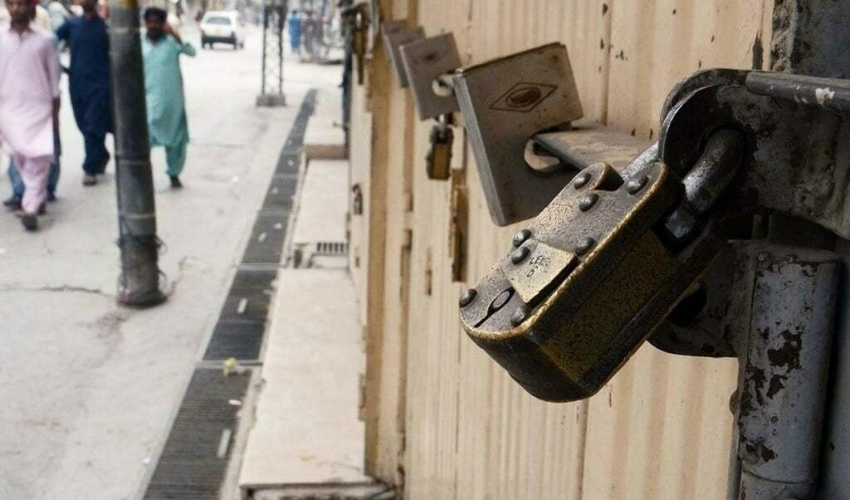Karachi, Lahore markets shut over traders’ nationwide strike
In Karachi, 750 small and large markets closed along with six key industrial zones
The core demands of the protesting traders include:
- Withdrawal of FBR Act 37AA, which they claim gives undue powers to tax authorities
- Rollback of taxes on bank transactions, which they argue disproportionately hurt small business owners
A massive shutter-down strike by traders across Pakistan disrupted business activities in major commercial hubs, as protests intensified against the Federal Board of Revenue’s (FBR) powers under Act 37AA and the new tax on bank transactions.
The protest, spearheaded by various traders’ associations, brought business to a halt in Karachi, where 750 small and large markets remained closed along with six key industrial zones. Similar scenes were witnessed in Lahore, where major wholesale and retail markets staged a full or partial shutdown.
In Karachi, the strike was declared a major success by trader organizations, with business completely suspended in major commercial areas, including
- Jodia Bazaar – the city’s largest wholesale market , Jamia Cloth Market
- Saddar Market, Fruit and Vegetable Market near Super Highway
The strike also extended to six industrial zones, disrupting production and logistics.
Despite the widespread shutdown, All Pakistan Textile Mills Association (APTMA) officials offered a different narrative. A former chairman of APTMA showed willingness to continue dialogue with the Federation of Pakistan Chambers of Commerce & Industry (FPCCI).
Meanwhile, APTMA’s Asif Inam stated that industrial activity remained normal and operations continued as per routine on any Saturday in many areas.
In Lahore, traders staged a strong protest against FBR’s Act 37AA and the new tax imposed on banking transactions, calling the policies “unjust and damaging to small businesses.”
Complete shutter-downs were observed in:
- Shah Alam Market, Akbari Mandi, Urdu Bazaar, Loha Market, Badami Bagh
Other areas such as Liberty Market, Anarkali Bazaar, and Hall Road witnessed partial strikes.
President of the Lahore Traders Association, Mujahid Maqsood Butt, called it a token strike, warning that the protest could intensify if demands remain unmet. He emphasized that traders would continue their resistance in phases until written assurances are provided by the government.
Buyers from out of town who came to shop in Lahore were left stranded, as most of the city’s key business centers remained shut.
The core demands of the protesting traders include:
- Withdrawal of FBR Act 37AA, which they claim gives undue powers to tax authorities
- Rollback of taxes on bank transactions, which they argue disproportionately hurt small business owners
Pakistan’s business community appeared deeply divided on Friday over a proposed nationwide shutter-down strike, with the Karachi and Lahore Chambers of Commerce confirming their participation while the Federation of Pakistan Chambers of Commerce and Industry (FPCCI) opted out.
In a press conference, Karachi Chamber of Commerce and Industry (KCCI) President Javed Balwani formally announced a nationwide one-day shutter-down strike for Saturday. “This will be the first phase of protest,” Balwani said, indicating the strike could escalate if their demands remain unmet.
He revealed that although productive talks were held with Special Assistant to the Prime Minister Haroon Akhtar, a consensus could not be reached due to a lack of formal documentation. “We asked for written assurances and minutes of the meeting, but nothing was provided,” he stated. “We consulted all stakeholders before taking the final decision.”
Lahore Chamber President Abuzar Shah also endorsed the move, confirming Lahore’s participation in the strike to protest the Federal Board of Revenue’s (FBR) expanded powers and recent taxation measures.
However, the FPCCI — the country’s largest umbrella organization representing traders — announced that the strike has been postponed. Senior Vice President Saqib Fayyaz Magoon confirmed to Samaa TV earlier that the government had accepted key demands, including halting the implementation of certain FBR powers.
“There will be no strike tomorrow,” Magoon had said, adding that a message had been sent to traders nationwide confirming the decision to hold off.

